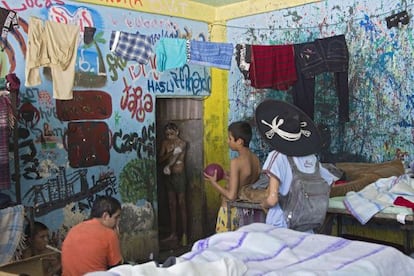“Mamá Rosa could not have known about everything that was happening”
The Mexican government opens the shelter where 592 people lived in slave-like conditions

Until last Tuesday, Rosa del Carmen “Mamá Rosa” Verduzco was one of the most emblematic and influential figures in Zamora, the third-largest city in Michoacán (southern Mexico). Now she is at the center of a scandal that has marked a definite before and after for the 140,000 residents of that city. Mamá Rosa, the founder of La Gran Familia shelter, has been in hospital since her arrest. The Mexican government has allowed the media to enter the center where 592 people, including 452 children, lived.
Inside, the floor is sticky and it smells exactly like what one would expect from an overcrowded place where almost 600 people and several animals have been living for too long. Authorities have found sheep, pigs, chickens and even some cows. There is a pile of garbage in one corner of the yard and 20 rusty and broken typewriters in another.
The smaller kids are pushing a plastic car and smiling while hooded police officers work. Some of the young adults are focusing on playing their wind instruments. The compound at La Gran Familia has two courtyards, a farm in the back where the animals were kept, two three-story buildings and one two-story house where the kids and adults lived, separated by ages.
The women who gave birth while living at the shelter say that Mamá Rosa supported them
Some of the stories make the blood run cold. Zamora residents say the kids did not beg on the streets. “There was an annual collection but they did not take them out to beg for alms.”
Even those within La Gran Familia do not have all the details. The women who gave birth while living at the shelter – many of them still look like young girls – say that Mamá Rosa supported them and that “she made their social security payments” when they gave birth. They talk about entire generations that have grown up there and say they are grateful to her. “It is not Mamá Rosa’s fault,” Fátima says. “She could not have known everything that was happening.” Another woman, Azucena adds: “The bad guys were the caretakers.”
In the face of serious accusations – slave-like and inhumane conditions, sexual and psychological abuses – some intellectuals, such as Jean Meyer and Enrique Krauze, have come to Mamá Rosa’s defense. Former presidents Vicente Fox and his wife, Martha Sahagún, a native of Zamora, have also shown their support.
On Thursday, about 200 people wearing white t-shirts with a pink logo that expressed their support for Mamá Rosa showed up for a march in Zamora. “You are not alone,” the crowd chanted. These demonstrators met with a group of individuals who say they are waiting for their relatives, whom they believe are still inside the shelter. “It was time for the government to come in. It had been many years,” the aggrieved family members responded.
Translation: Dyane Jean François
Tu suscripción se está usando en otro dispositivo
¿Quieres añadir otro usuario a tu suscripción?
Si continúas leyendo en este dispositivo, no se podrá leer en el otro.
FlechaTu suscripción se está usando en otro dispositivo y solo puedes acceder a EL PAÍS desde un dispositivo a la vez.
Si quieres compartir tu cuenta, cambia tu suscripción a la modalidad Premium, así podrás añadir otro usuario. Cada uno accederá con su propia cuenta de email, lo que os permitirá personalizar vuestra experiencia en EL PAÍS.
¿Tienes una suscripción de empresa? Accede aquí para contratar más cuentas.
En el caso de no saber quién está usando tu cuenta, te recomendamos cambiar tu contraseña aquí.
Si decides continuar compartiendo tu cuenta, este mensaje se mostrará en tu dispositivo y en el de la otra persona que está usando tu cuenta de forma indefinida, afectando a tu experiencia de lectura. Puedes consultar aquí los términos y condiciones de la suscripción digital.








































